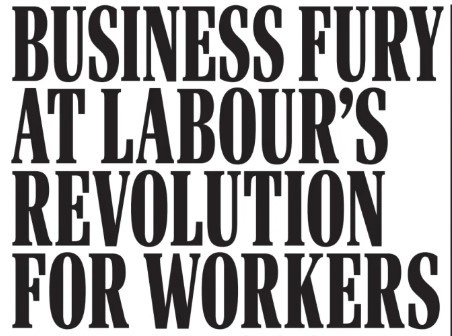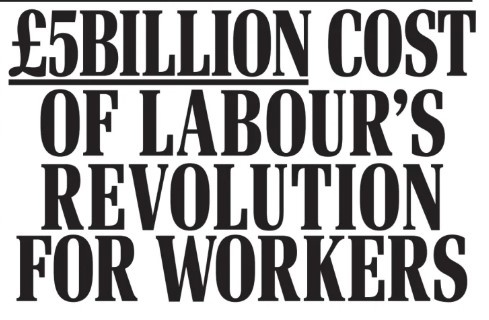By Andy Ford, Unite rep
Labour’s New Deal for Working People, now rebranded as Labour’s Plan to Make Work Pay, is currently making its way through the various committee stages of the House of Commons. It had already been diluted by Starmer and Reeves, under pressure from corporate lobbyists, but still about three quarters of what they had agreed with the unions was delivered in the draft Bill. Its implementation, however, has slipped drastically from the ‘first 100 days’ as was promised incessantly by top Labour figures.
As the progress of the Bill shows, it is no simple matter to challenge the capitalist class in what they regard as their special preserve – the workplace. First, we had the lobbyists sliming around the Labour leadership. Then, once the bill was tabled, the Tory press swung into action with absurd claims that giving workers back some of the rights taken by the Tories since 1979 would mean that “small businesses will be smashed”, that it will cause “rising prices” and it will “hand power to the unions making it far easier to stage walk outs…” (Daily Mail October 22, 2024). In fact, everything short of ending life on the planet.
It seems to have escaped these hired hacks that Britain’s economy grew hugely in the 1950s and 60s when Britain’s trade unions were free of restrictions. In fact, they still won’t be as free as those days, even when the Labour bill goes through.
Working class households experienced declining standards
All that trade union rights ever did was to make sure that the workers, the real wealth producers, got a share of any growth. Since trade union rights were curtailed, only the wealthy have benefited from economic growth and most working people have experienced a stagnant or declining living standards. And the British economy has stagnated.
Now, an obscure government body, the Regulatory Policy Committee (RPC), has stepped out of the shadows to attack the Employment Rights Bill. The Committee consists of eight people, all of whom are either capitalists or senior corporate economists i.e. the faithful servants and lap dogs of the bosses.

This Committee is functioning almost like an unelected third chamber of parliament. The members were put there by the previous Tory administration to check on all legislation for its impact on business. It is a total disgrace.
Any proposed legislation that has a regulatory impact has to have an Impact Assessment (IA) submitted to this RPC, with the rationale, of identifying options and providing justifications. So, the elected Labour government has to justify its proposals on employment law to an unelected committee, who then issue an official opinion on it.
The committee have now put out an appraisal of each of the Bill’s sections, using that tired old corporate cliché of RAG (Red or Green). Not surprisingly, the Tory-appointed, corporate-friendly, unelected Committee finds much to be concerned about in the Employment Rights Bill, rating it overall as ‘Not Fit for Purpose’.
They have special problems with four parts of the Bill – employment rights from Day 1, repeal of the anti-union Trade Union Act of 2016, repeal of the Strikes Minimum Service Level Act of 2023, and the Fair Pay Agreement proposed for adult social care.
Union law of 2016 aimed to hobble union activity
But what is the point of employment rights if a shady employer can get round them by dismissing workers 23 months after being taken on?…which is common practice in call centres. The anti-union law of 2016 hobbled the unions’ ability to call strikes with rules on turnout that would invalidate most council elections and many parliamentary elections, and that was on top of what were already the most repressive anti-union laws in Europe.
The Minimum Service Levels Act, which can force union members to work even after a ballot, is widely accepted to be unworkable and incompatible with basic democratic norms. And low pay in the adult care sector is one of the causes of the crisis across social care, which in turn is dragging down the NHS with thousands of vulnerable old people stuck in hospital beds because there is nowhere to discharge them to.
The idea that these eight highly-paid and unelected academics, economists and capitalists should pronounce against fair pay for care workers is the very essence of hypocrisy. Would they like to work nights looking after vulnerable and confused old people for a minimum wage and the bare minimum of rights?
The eminent Committee’s argument against the measures in the Bill is a simple one – it will cost businesses money! The other side of that, of course, is that it will put money in the pockets of workers. The RPC’s judgement is class politics dressed up as ‘objective advice’, yet injected right into the heart of government.
Committee would abolish all workers’ rights
They advance the argument that employers will reduce wages or raise prices, or both. On that basis all workers’ rights like weekends, overtime pay, maternity and sick pay should also be abolished, because they also “increase costs to business”. The RPC seems to be claiming that cutting regulations follows through to lower prices.

In fact, the opposite is true: we see example after example of firms using regulatory changes to increase profits by keeping prices the same. Remember the cut in fuel duty on unleaded petrol? The oil companies just increased the price of leaded petrol to create a price difference, and took the profits. And they were allowed to do that.
The Labour government must reject the Regulatory Policy Committee’s ‘advice’ as self-serving nonsense. And abolish the RPC immediately. Imagine if the trade unions had an official committee appointed to scrutinise all legislation for its impact on their members. It wouldn’t happen, and it certainly would not be enthusiastically endorsed and quoted by the Daily Mail!
With trade union rights restored, or even improved, workers will be able to solve their own problems, from bullying, to pay to cut,s to fire and rehire. Labour must stick to its manifesto pledges and pass the Employment Rights Bill.
Trade union branches should look at this issue and move resolutions to go to local Labour Parties, but especially to their own union regional and national committees. The union leaders should be demanding that this bosses’ committee is shown the door.



